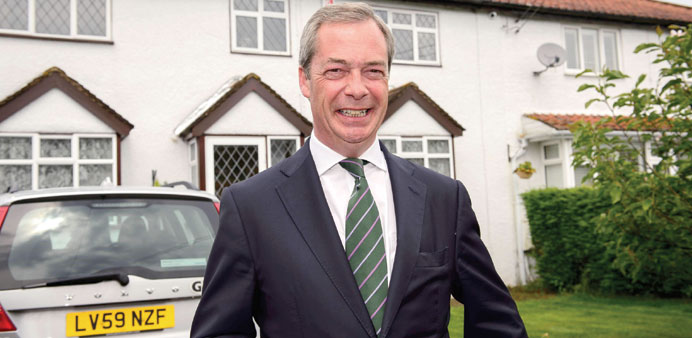|
The European Union woke up yesterday to a confusing picture of eurosceptics celebrating unprecedented wins in some major countries, but licking their wounds in others - leaving wide open questions about whether they can turn EU lawmaking on its head. |
Many eurosceptics despise the very union they have campaigned to serve in the European Parliament, leading observers to worry that they will work to dismantle the EU from within.
“I don’t just want Britain to leave the EU, I want Europe to leave the EU. I don’t believe that flag, that anthem and that president whose name no one knows really represent what Europe should be,” British eurosceptic leader Nigel Farage said on Sunday, as four days of voting in the European elections came to an end.
Farage was likely referring to outgoing EU president Herman Van Rompuy.
The provocative politician’s UK Independence Party (UKIP) had not been a major force to worry about so far, holding just 10 seats among more than 750 seats in the EU’s parliament.
In last week’s European elections, however, UKIP trounced the Conservative and Labour parties after winning over British voters with an anti-EU and anti-immigration campaign. With 10 out of 12 regions counted by yesterday, it looked set to scoop up 23 seats.
In France, similarly, the far-right National Front (FN) left mainstream parties dumbstruck by coming in first with 26% support, according to provisional results.
That would give it 24 seats in the European assembly, an improvement of 800% on its current tally of three. Prime Minister Manuel Valls called it a “very grave moment for France and Europe”.
In another of the EU’s largest countries, however, the picture was completely different.
Italy had been bracing for gains by the anti-establishment Five Star Movement of comedian Beppe Grillo, amid widespread public frustration over the economic woes the country has been facing.
“This time we are not going to just win. We are going to trash them,” Grillo had declared on Friday.
Instead, voters delivered a resounding win to Italy’s Prime Minister Matteo Renzi, awarding his centre-left Democratic Party 40.8% of votes and 32 seats in the EU parliament - the best-ever performance for an Italian left-of-centre party.
Grillo’s party was expected to come in a distant second with 21.2% of the votes and 17 seats.
“Italy was the country where the worst could have happened, and instead it delivered the most surprising message of hope,” Renzi said yesterday, describing the vote as an endorsement for his domestic reforms. “We will live up to the most beautiful dreams.”
Dutch voters also unexpectedly shied away from the far-right, anti-immigrant Party for Freedom of eurosceptic Geert Wilders, which lost 3.8 percentage points from its 2009 take. It is still, however, in line to have four seats in the next European Parliament.
Eurosceptics and far-right parties could theoretically create havoc in EU affairs by vetoing legislation in the assembly, hampering reforms or blocking international agreements such as trade deals.
But that would require them to form alliances against the pro-EU groups in the parliament, which still hold the vast majority of seats.
The conservative European People’s Party, the Socialists, the Liberals and the Greens alone are expected to control just under 70% of the 751 seats in the new parliament, which will be in place for five years from July 1.
The big open question is with whom the new eurosceptic and far-right legislators will align themselves.
Provisional results compiled by the parliament list some 63 members who are not yet allied. UKIP’s Europe of Freedom and Democracy Group could recruit some eurosceptics, but other groups have also been lobbying new members.
The far-right faces an uphill battle too for widespread influence in the parliament, given divisions among its ranks. The FN has already indicated that it wants nothing to do with Greece’s ultra-nationalist Golden Dawn and Hungary’s “radical nationalist” Jobbik.
In turn, eurosceptic parties have been ambivalent about affiliating with the FN, with Farage for instance saying he felt the party was still tainted by anti-Semitism.
“Fears of policy paralysis at the eurozone level are overblown,” James Howat of the Capital Economics research group predicted. “Mainstream parties will retain control of the European Parliament.”
“Up to now, most eurosceptic parties have not been able to develop a significant level of co-ordination, preventing them from having influence in actual policy decisions,” ING bank analyst Carsten Brzeski said.
“The remaining 70% of non-eurosceptical parties will simply be forced to work closer together.”

